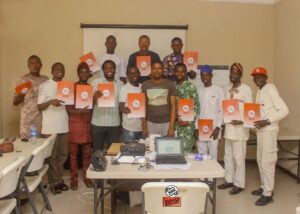In this piece, Sylvester Udemezue takes his time to analyse the Legal implications of two-thirds majority vote in removal of Nigeria’s head of legislative house:
Democracy is a system of rule by laws, not by individuals. In a democracy, the rule of law protects the rights of citizens, maintains order, and limits the power of government. All citizens are equal under the law and no one is above the law. All actions of public and private individuals are governed by law. No one may be discriminated against on the basis of their race, belief, religion, ethnic group, gender, or political interest, group or affiliation. All actions of public and private individuals are governed by law.
It’s for this reason that Thomas Paine once wrote (about America) in his famous book, Common Sense: “…that the world may know, that so far as we approve of monarchy, that in America the law is king.
For as in absolute governments the King is law, so in free countries the law ought to be King; and there ought to be no other.”
And as Michael Joseph Oakeshott FBA (1901 – 1990), English philosopher to be present and vote at a meeting, it doesn’t have to be everybody; it’s those who happen to be there. “Once they meet the quorum of one-third, and he is there, he can be removed by two-thirds of that one-third.”
While I am yet unable to agree that those words actually emanated from the revered Professor, I need to state that I respectfully disagree with the said comment or view on what constitutes two-thirds majority of the Senate for the purpose of removing a sitting Senate President.
The provisions of Section 50 of the Constitution of the Federal Republic of Nigeria, 1999, as amended, are reproduced here: (1) There shall be- (a) a President and a Deputy President of the Senate, who shall be elected by the members of that House from among themselves; and (b) a Speaker and a Deputy Speaker of the House of Representatives, who shall be elected by the members of that House from among themselves. (2) The President or Deputy President of the Senate or the Speaker or Deputy Speaker of the House of Representatives shall vacate his office- (a) if he ceases to be a member of the Senate or of the House of Representatives, as the case may be, otherwise than by reason of a dissolution of the Senate or the House of Representatives; or (b) when the House of which he was a member first sits after any dissolution of that House; or (c) if he is removed from office by a resolution of the Senate or of the House of Representatives, as the case may be, by the votes of not less than two-thirds majority of the members of that House.
From the clear provisions of Section 50 (2) (c), as set out above, no one should be in doubt that a sitting Senate President may only be removed from office or impeached by a resolution of the Senate supported “by the votes of not less than two thirds majority of all the members of that House – whether dead or alive, and whether or not on suspension.”
With due respect to the learned professor of law, the two-third majority required by the Constitution is not just that of the members present during a sitting or meeting of the House, as erroneously represented by the learned professor, but by all the members of the House.
The constitution is clear on the meaning of the expression, “the members of the house” as used in Section 50 (2) (c) of the constitution. While Section 47 of the same constitution provides that “there shall be a National Assembly for the Federation which shall consist of a Senate and a House of Representatives,” Section 48 defines the composition of the Senate as follows: “the Senate shall consist of three Senators from each state and one from the Federal Capital Territory, Abuja.”
Altogether, there shall be 109 senators, since we have 36 states and the Federal Capital Territory. Any vote to impeach the ppresident of the Senate must be supported by at least 73 senators present and voting. This position is not affected by any vacancy in the membership of the Senate. Hence, Section 61 of the constitution provides that “the Senate or the House of Representatives may act notwithstanding any vacancy in its membership, and the presence or participation of any person not entitled to be present at or to participate in the proceedings of the House shall not invalidate those proceedings.” (3) It must be pointed out here that the provisions of section 56 must apply subject to the provisions of Section 50.
Section 56 provides as follows: “Except as otherwise provided by this constitution, any question proposed for decision in the Senate or the House of Representatives shall be determined by the required majority or the members present and voting; and the person presiding shall cast a vote whenever necessary to avoid an equality of votes but shall not vote in any other case; (2) Except as otherwise provided by this Constitution, the required majority for the purpose of determining any question shall be a simple majority.”
It must be stressed here that sitting/proceeding of the Senate for the purpose of impeaching the President or Deputy President of the Senate or the President or Vice President of the Federal Republic is a special sitting/proceeding. Hence the requirement for a two-thirds majority of all the members elected to the House. Such proceedings or business falls outside the ordinary business of the House.
The Latin legal maxim and canon of statutory interpretation, “generalia specialibus non derogant;” applies in the present instance. The maxim states that “universal things must not detract from specific things;” “general provisions in a statute must yield to special or specific provisions in the same statute.” See Dore v. Verdom [1997] 2 SCR 862, per Hon Justice Gonthier of Canada’s Supreme Court). Thus, when a matter falls under any specific provision, then it must be governed by that provision and not by any later general provision in the statute. Hence, the general provisions in a law must admit to the specific provisions of the same law. This is why the provisions of section 50 of the Constitution must necessarily prevail over the provisions of Section 56.
The reason said to be behind this principle of interpretation is this, that the legislature having had its attention directed to a special subject (in the present case, the special subject is impeachment proceedings), and having observed all the circumstances of the case and provided for them, does not intend by a later general enactment to derogate from its own act when it makes no special mention of its intention so to do. Applying this maxim, “generalia specialibus non derogant,” in the case of Lalonde v. Sun Life [1992] 3 SCR 261, Hon Justice Gonthier had this to say: “this is an appropriate case in which to apply the maxim generalia specialibus non derogant and to give precedence to the special Act….”
The principle is, therefore, that where there are provisions in a special Act and in a general Act on the same subject which are inconsistent, if the special Act gives a complete rule on the subject, the expression of the rule acts as an exception to the subject-matter of the rule from the general Act.” Back here in Nigeria, the maxim has been applied in several cases, including the case of Ibori V Ogboru (2004) 15, NWLR (PT 895) 154, where the Court declared as follows: “There is a canon of construction of statutes known as “generalis specialibus non derogant”. Its application is implied thus at p. 196 of Maxwell on The Interpretation of Statutes, 12th edition by P. St. J. Langan: ‘Now if anything be certain it is this,” said the Earl of Selborne, L. C. in The Vera Cruz, (1884) 10 App. Cas. 59 at p. 68 “that 4 where there are general words in a later Act capable of reasonable and sensible application without extending them to subjects specially dealt with by earlier legislation, you are not to hold that earlier and special legislation is indirectly repealed, altered, or derogated from merely by force of such general words, without any indication of a particular intention to do so.’” See also Akindolire V. Akindolire (1977) 1 FCAR, 148, where the court stated that “it has been held on the same maxim of “generalis specialibus non derogant”that the position of an earlier Special Act will not be affected by that of a later general Act although inconsistent with the earlier particular Act and although they deal with the same subject matter.”
Similar to the provision on removal of the Senate President, Deputy Senate President, Speaker of the House of Representatives and Deputy Speaker of the House of Representatives is the provision regarding the removal of the Speaker or Deputy Speaker of a State House of Assembly in Nigeria, Section 92 (2) (c) of the Constitution provides that “the Speaker or the Deputy Speaker of the State House of Assembly shall vacate his office if he is removed from office by a resolution of the House of Assembly by the votes of not less than two-thirds majority of the members of the House.” While interpreting Section 92 (2) (c) regarding what constitutes two-thirds majority of members of a House of Assembly for purposes of removing the Speaker of the House, the Court of Appeal in the case of Asogwa v. Abel Chukwu (2003) 17 WRN, 71, recognised and emphasized that it is two-thirds majority of all members of the House of Assembly that is required to remove the Speaker.
Now, if the Speaker of the House of Assembly of a state may not be removed except by a resolution supported by the votes of at least two-thirds majority of all members of the House of Assembly, why should anyone think that anything less than that majority could be legally sufficient to remove the President of the Senate of the Federal Republic?
Another special proceeding of the National Assembly in which the vote of two-thirds majority of all the members of the House is mandatory is with regard to Legislative Veto of Executive Assent. Section 58 (4) and (5) of the Constitution provide that: “(4) Where a bill is presented to the President for assent, he shall within thirty days thereof signify that he assents or that he withholds assent. (5) Where the President withholds his assent and the bill is again passed by each House by two-thirds majority, the bill shall become law and the assent of the President shall not be required.”
In the case of the National Assembly V the President, Federal Republic Of Nigeria (2003) 41 WRN 94, while delivering the lead judgment, Oguntade, JCA stated as follows: “Further, section 58(5) provides that a bill must be passed again by “each house by two-thirds majority”. I observed earlier that Sections 48 and 49 of the Constitution set out the composition of the Senate. It is three senators from each state of the Federation and one from Federal Capital Territory Abuja. Thus, 5 the number of the Senators should be 109. Under section 49 the House of Representatives is composed of 360 members. Giving Section 58(5) its ordinary natural meaning, two-thirds majority of each House can only mean two-third of the membership of each of the Senate and the House of Representatives. It cannot mean anything else. The section has no relationship with the ordinary quorum of each House. It does not employ a language referable to a proportion of the membership of each House. It is two-thirds of each of the whole of the Senate and the House of Representatives.
In order to override the president’s veto there must be at least 73 members in the Senate and at least 240 members in the House of Representatives. But as I observed earlier, when the Senate made a motion of veto to override the Bill on 25/9/2002, there were only 55 senators present. In the House of Representatives on 26/9/2002 when a motion of veto override was made there were only 204 members. Clearly therefore, the appellant was not properly constituted when the Bill was passed into law on 25/9/2002 and 26/9/2002. The appellant was also not following the Section 58(5) of the Constitution when instead of passing the bill again, it merely made a motion called “motion of veto override”. The lower court was, therefore, in error to have taken the position that what was needed to pass the bill was the ordinary working quorum of the appellant and that the “motion of veto override” was in order.”
While concurring with the lead judgment in the same case, Oduyemi, JCA declared as follows: “The normal rule of interpretation of the constitution or of any statute for that matter is that general provisions must give way to special provision – see A-G., Abia State v. A-G., Federation (supra). By virtue of that argument, I am convinced that the special provision of 2/3 majority of each House or of a joint sitting of both Houses take supremacy over the general provisions of the statute with regard to quorum and a simple majority contained in sections 54 and 56 of the Constitution. In the event, I am of the view that what is required in a proper application of section 58(5) of the Constitution is for the Bill to be supported by at least 73 members of the Senate and be supported by at least 240 members of the House of Representatives at a repeat third reading of the Bill.
There is no confusion with regard to the proper construction of the Section 50 (2) (c) relating to impeachment or removal of the President of the Senate of the Federal Republic. Nothing short of two-thirds majority of the entire membership composition of the Senate is qualified to validly remove the Senate President. Two-thirds majority of the 109-member Red Chamber has been held to be 73 senators, as seen above. I therefore respectfully urge Nigerians to respect the rule of law and constitutionalism. It is the only safe way to reserve and grow our democracy to maturity. Whereas in this instance, the words used in the constitution are clear and unambiguous, they must be given their plain evident meaning. See Attorney-General Bendel State v. Attorney-General of the Federation (1981) 10 SC 1; (1982) NCLR 1. Those who have the duty to interpret the provisions of a statute or constitution must look at the statute or constitution as a whole 6 in order to not veer away from the intendment of its framers. In P.D.P. v. INEC (1999) 11 NWLR (Pt. 626) 200 at page 142 Chief Justice Uwais pointed to what is required to be done in interpreting the provision of a statute or Constitution: “It is settled that in interpreting the provisions or Section of a statute or indeed the Constitution, such provisions or section should not be read in isolation of the other parts of the statute or Constitution. In other words, the statute or Constitution should be read as a whole in order to determine the intendment of the makers of the statute or constitution.”
See also the case of held in Ojukwu V Obasanjo (2004) 12 NWLR (PT 886) 169. In conclusion, I personally, respectfully pray and expect that fairness, even-handedness and above all respect for rule of law would characterize the behaviour and standards of all men who find themselves in public offices. This was the position of His Lordship, Hon Justice Ibrahim Mohammed Musa Saulawa, JCA in a judgment delivered on January 4, 2007, in appeal No: CA/PH/161/99 in the case of Whyte V Kwande. And in the famous case of Chibuike Rotimi Amaechi V. INEC & 2 ors (2008) 1 SCNJ 1; (2008) 5 NWLR (Pt. 1080) 227), His Lordships, Pius Olayiwola Aderemi, JSC had advised thus: “in all countries of the world which subscribe to and operate under the rule of law, all actions of both private and public persons are always adapted to the laws of the land. We ought to allow this time-honoured principle to sink well into our heads and hearts.” Nigerian lawyers have a greater role to play in the preservation of order, constitutionalism and respect for rule of law in Nigeria for the promotion and preservation of our nascent democracy. In recognition of this responsibility, Rule 1 of the Rules of Professional Conduct for Legal Practitioners (RPC), 2007 imposes on every legal practitioner in Nigeria a perpetual duty “to uphold and observe the rule of law,” and to “promote and foster the cause of justice.” See also Rule 15, RPC. Donald Horne (1921- 2005) was an Australian journalist, writer, social critic, and academic. In his book, 10 Steps to a More Tolerant Australia, he had written: “the ideal of the rule of law, along with equality under the law, is one of the bases of tolerance. It means that, one way or another, governments themselves must act in accordance with the law- a responsibility they sometimes try to evade. ….
In a liberal-democratic society the rule of law also means that there must be open discussion about those laws and how they are being upheld in the courts. It also means predictability — known rules about the relationship between people and governments, and in certain matters, between individuals. It is intended to mean fairness .…”






